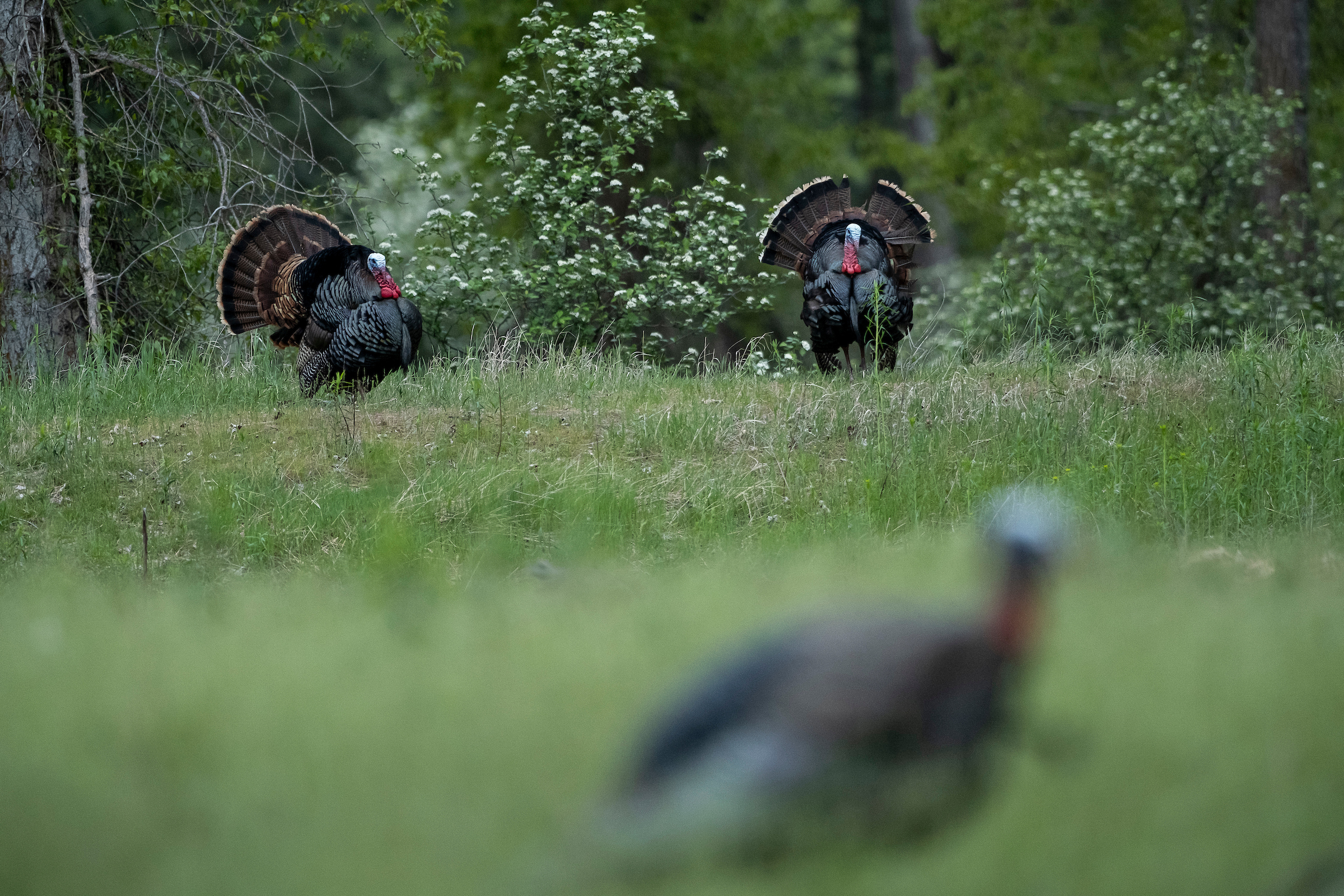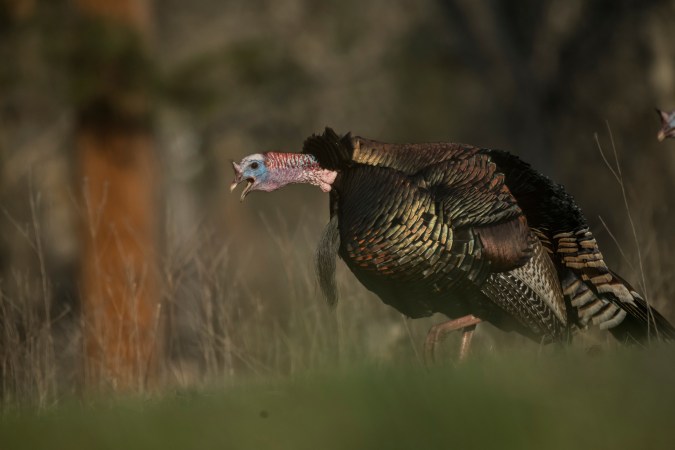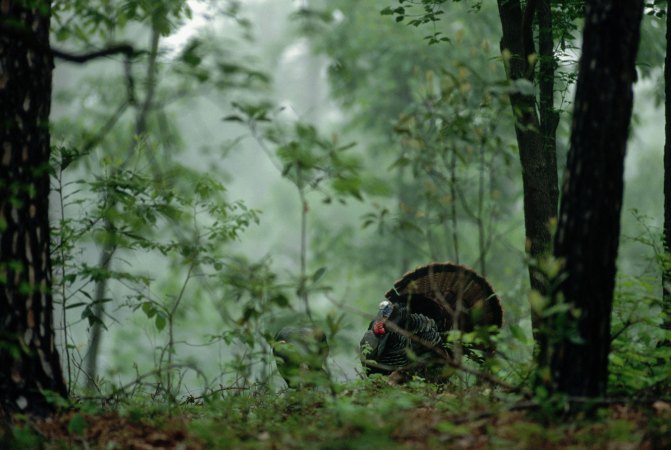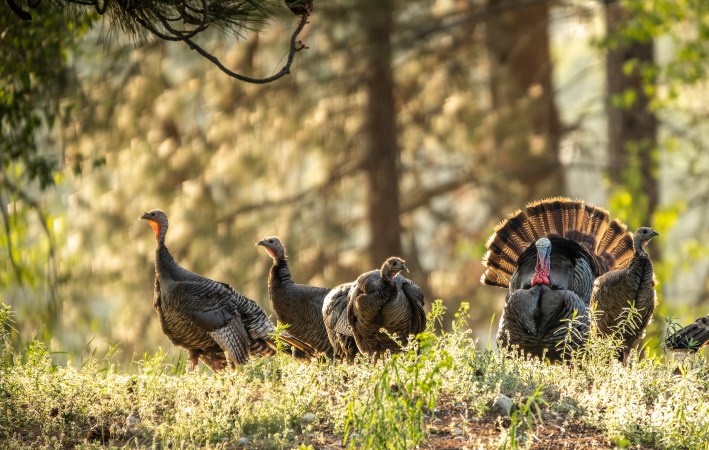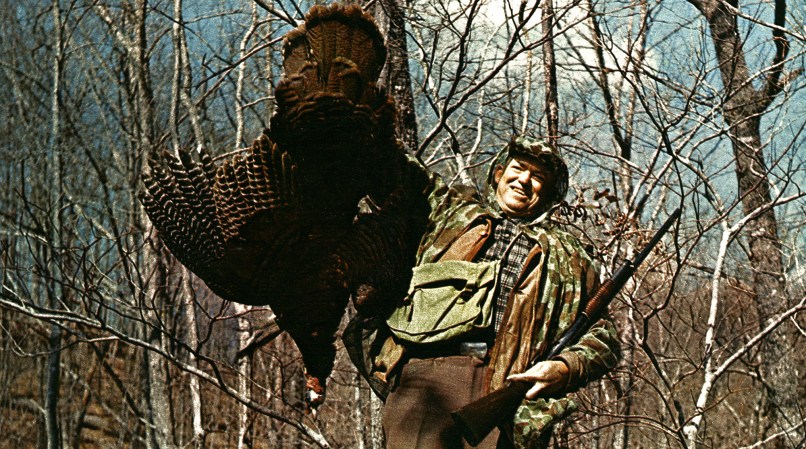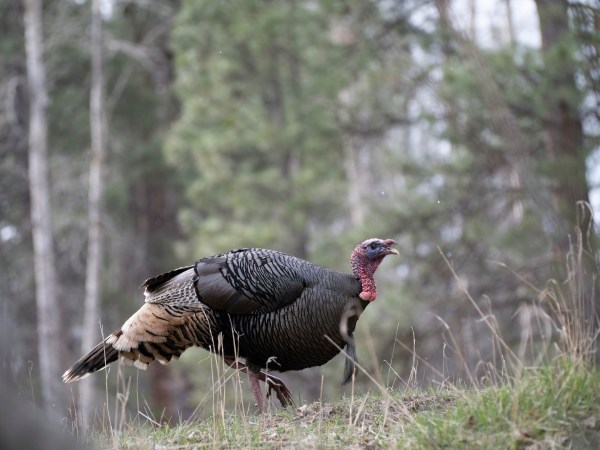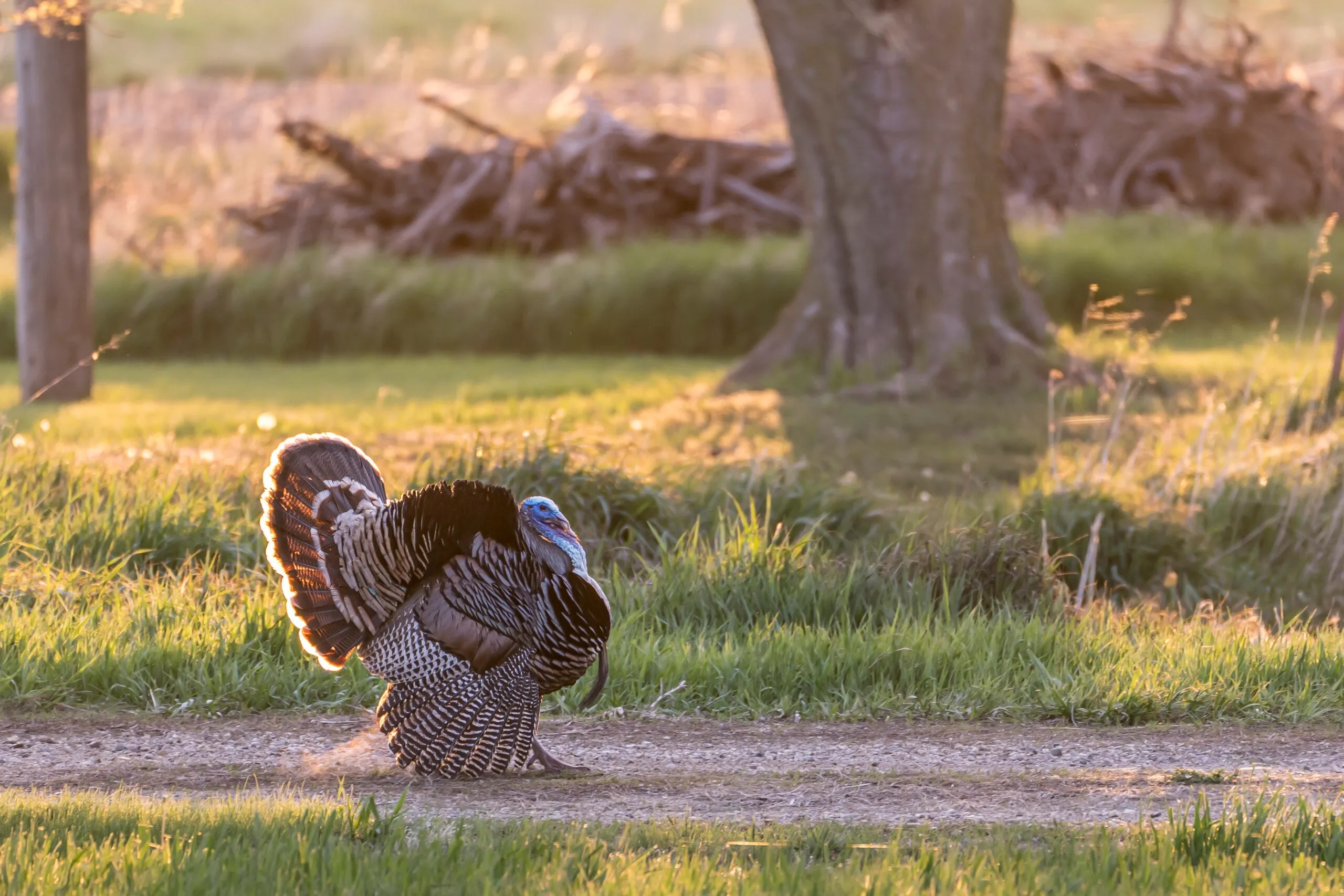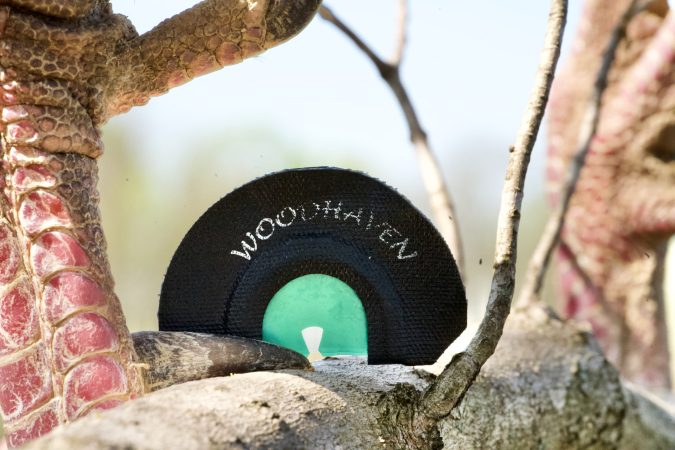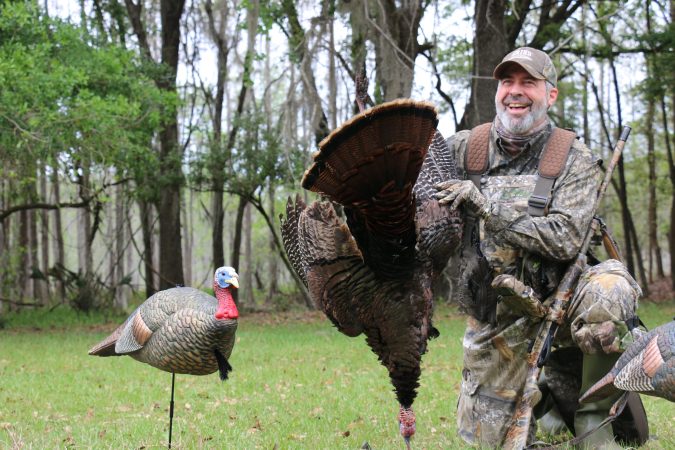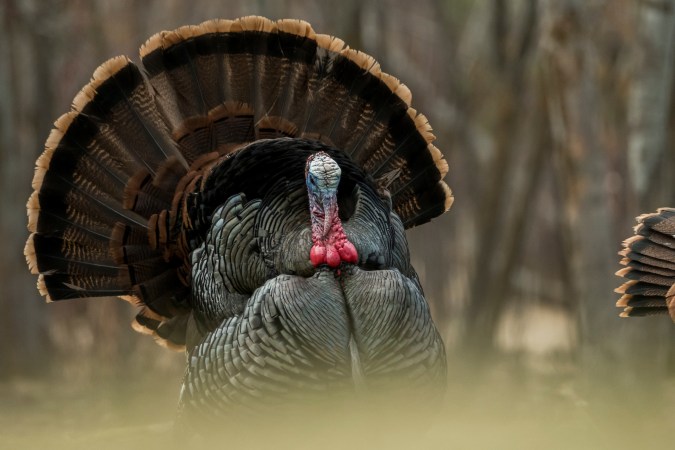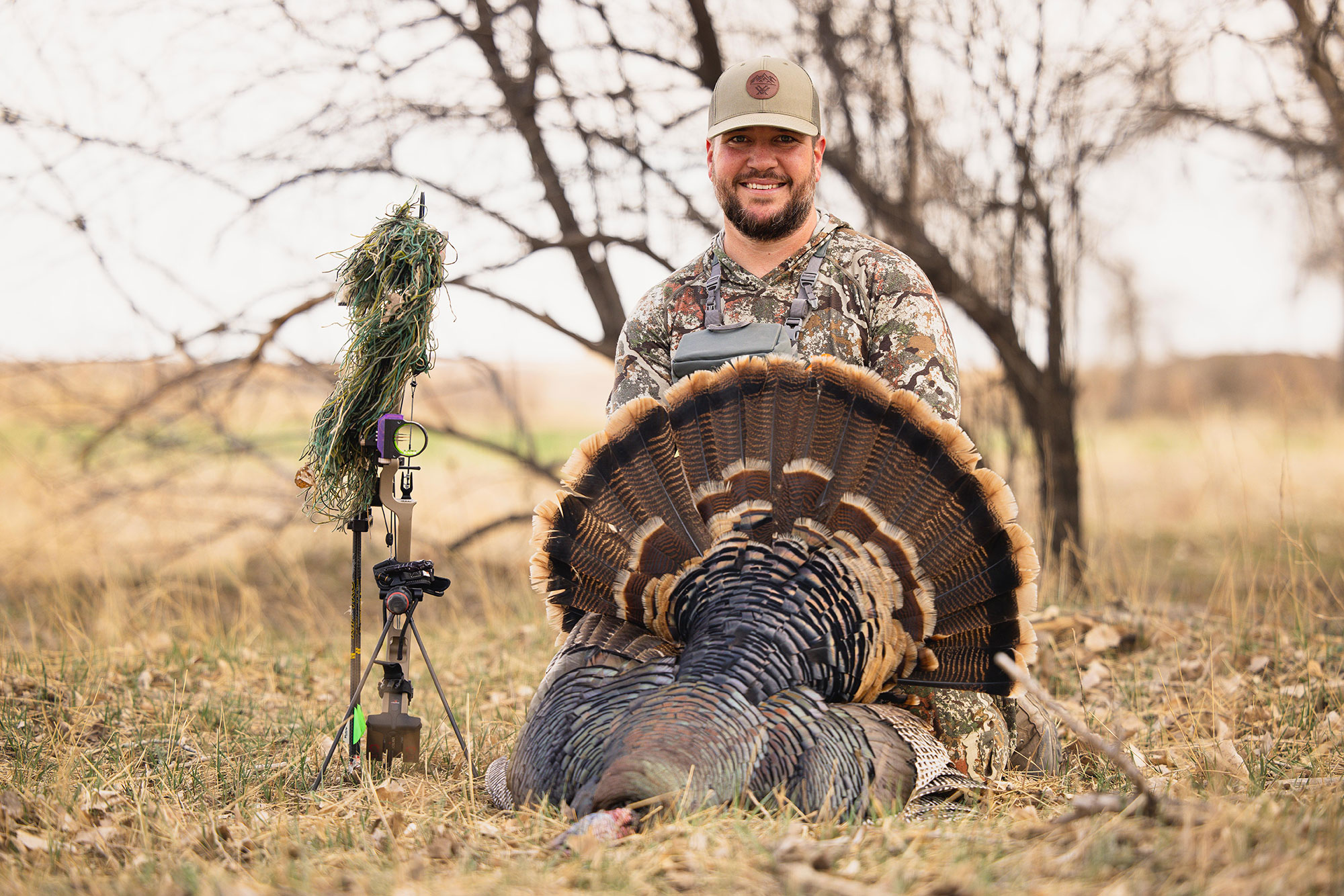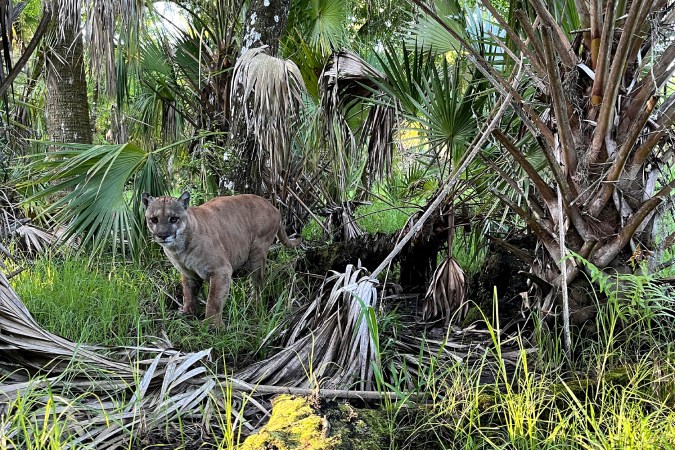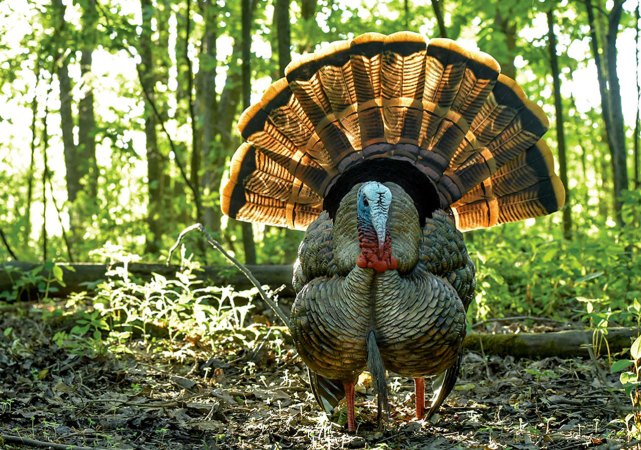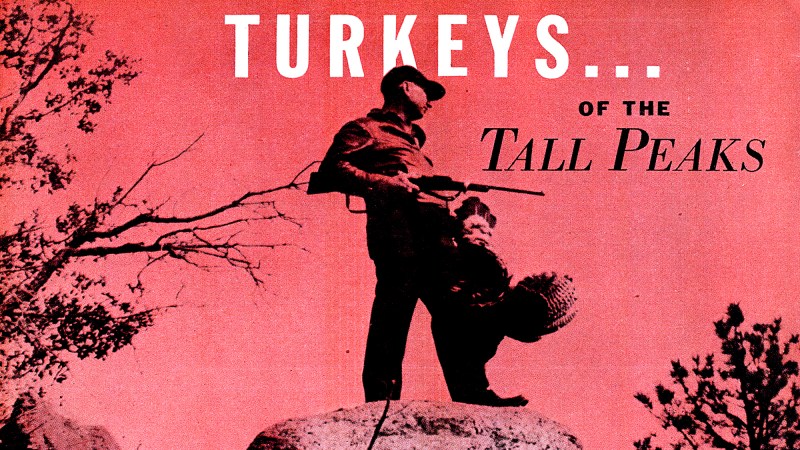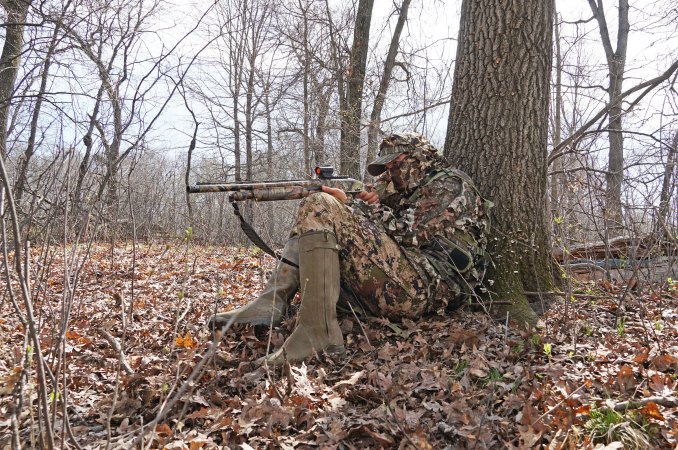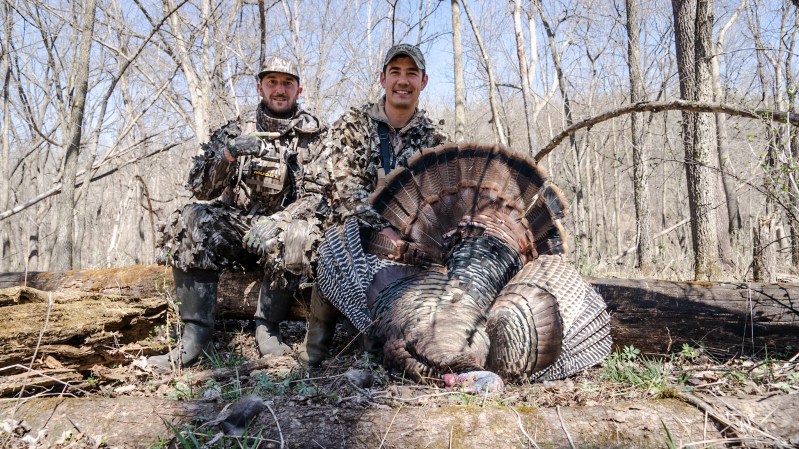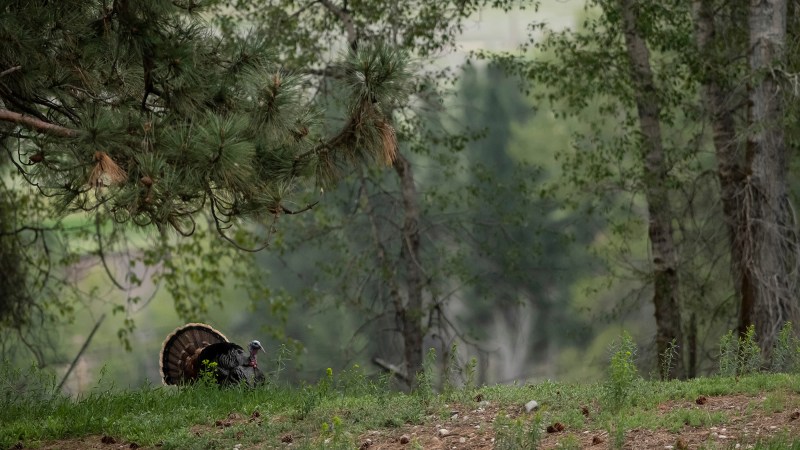Some mornings, turkey hunting is easy. The tom gobbles his head off while on the limb. He flies down in your direction. After you give him a few yelps, he struts right into your setup and then stands there with his head sticking out at 20 yards while you press the trigger. This scenario happens maybe once out of every 100 hunts—if you’re lucky.
The following list of turkey hunting tips—collected from turkey hunting experts with decades worth of experience—are for all the other mornings. Use them when gobblers get hung up, henned up, go quiet, or have seemed to vanish altogether. Because the truth is that most mornings, turkey hunting is pretty damned hard. Hopefully these tips on calling, gear, and tactics will make it just a little bit easier.
Turkey Calling Tips
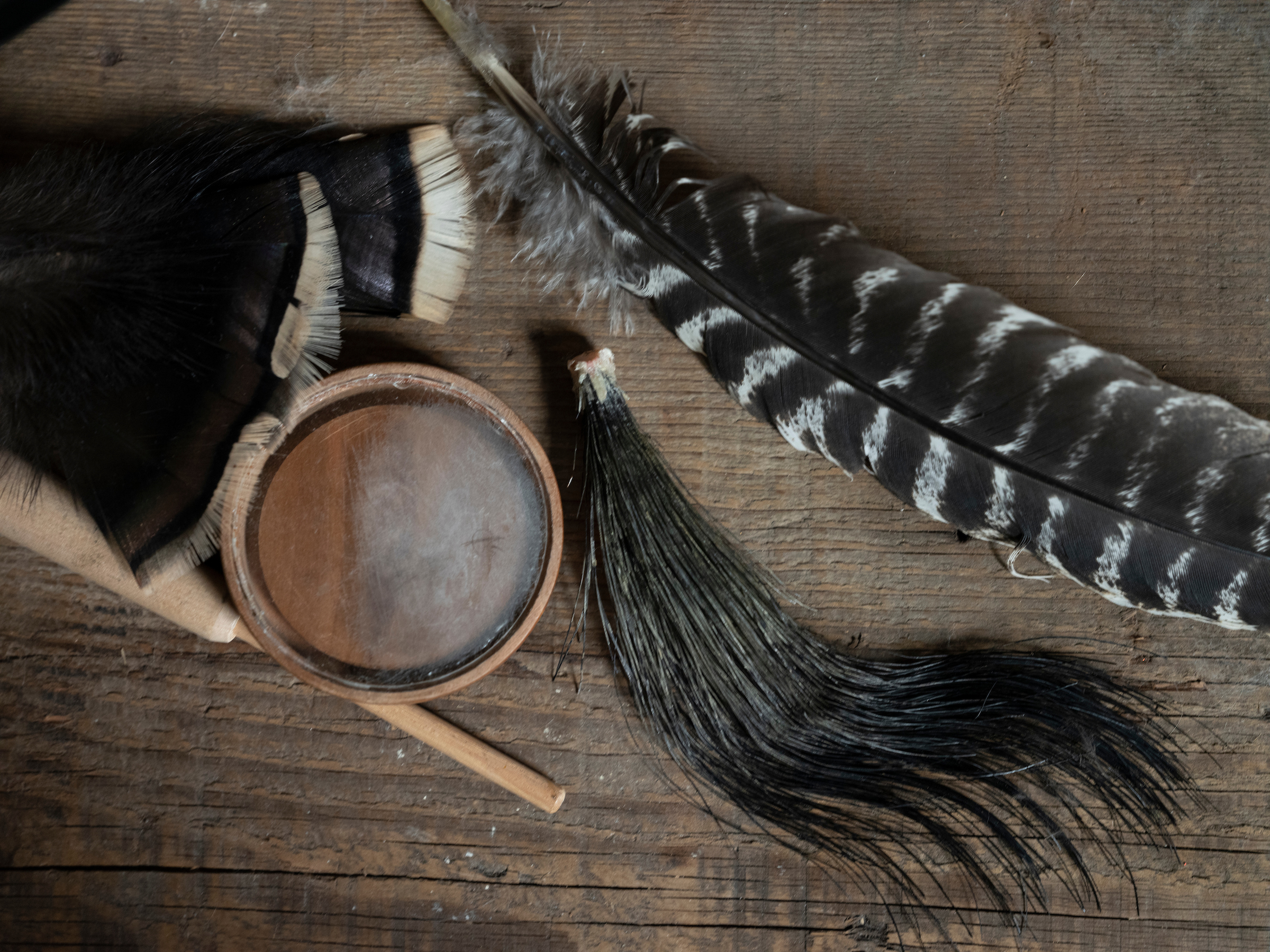
Mix up your calling. Listen closely and you’ll hear that turkey hens mix delicate squeals, whines, purrs, and moans with their clucking and yelping. These little falsetto notes can drive a gobbler wild. Tweak your calling to have the same effect. Those off-beat notes you mix in a string of yelps can bring a stubborn bird running. (Read our full guide to turkey calling tips, here).
Start softly. On every gobbler you set up on, call lightly at first and then increase the volume as necessary, yelping and clucking with a bit more volume and vigor as you go. On eight out of 10 toms, light to moderate calling will do the trick.
Use your jaw. Two keys to using the mouth call: Don’t simply blow across the reeds, but huff air up from deep in your diaphragm. And work your jaw up and down when you yelp, just like when you talk.

Run a friction call properly. If you’re right-handed, hold a slate (or glass or aluminum) pot lightly in your left hand and up on your fingertips. Grasp the peg as if writing with a pencil. Hold the striker at a 45-degree angle to the call’s surface. To yelp, work the peg either in little circles or short straight lines, whichever works best for you. Don’t lift the striker off the surface as you call. To purr, exert just enough pressure on the peg so that it skips lightly over a slate surface in little lines or half-circles. Purring on a slate call is the best way to pull a tom those last few yards into shotgun range.
Read Next: Best Slate Calls

Keep a gobbler guessing. When a bird gobbles in a spot where he cannot possibly see you (i.e. behind the lip of a ridge or hidden behind foliage), cup a hand to your mouth and turn your head left and right while running a diaphragm. Reach out and work a friction call to either side of your body, and even behind you. Varying not only the line but also the volume of your calls enhances their melodious effects. This keeps a tom moving and wondering, “Where is that sweet little hen?”
Close the box. To yelp on a box call, Mississippi turkey wizard Will Primos says to move the handle an inch or so off to the side of the sounding lip and “close the box” to run two notes together—kee-owk. “Light pressure on the lid will give you raspy yelps; put a bit more pressure on the handle for higher notes,” says Primos.
Strike a gobbler with cutting. Cutting on a pot-and-peg call (a glass or aluminum surface is ideal) is a good way to locate silent gobblers strutting around during the midmorning or afternoon hours. But don’t get carried away and string together too many loud, aggressive, irregular clucks and pocks that can drown out a turkey’s gobble. Rather, cutt in sharp, 3-second bursts, then stop abruptly and listen. A single shock gobble, faint if it’s off in the distance, is often all you’ll get.
Give your call room to work. When running a box or glass call, hold it well away from your body and point it toward a ridge or creek bottom where you think a silent tom might be strutting. This enhances the volume of your yelps and cutts, and helps funnel them to where you think a turkey might be.
Turkey Hunting Tips & Tactics
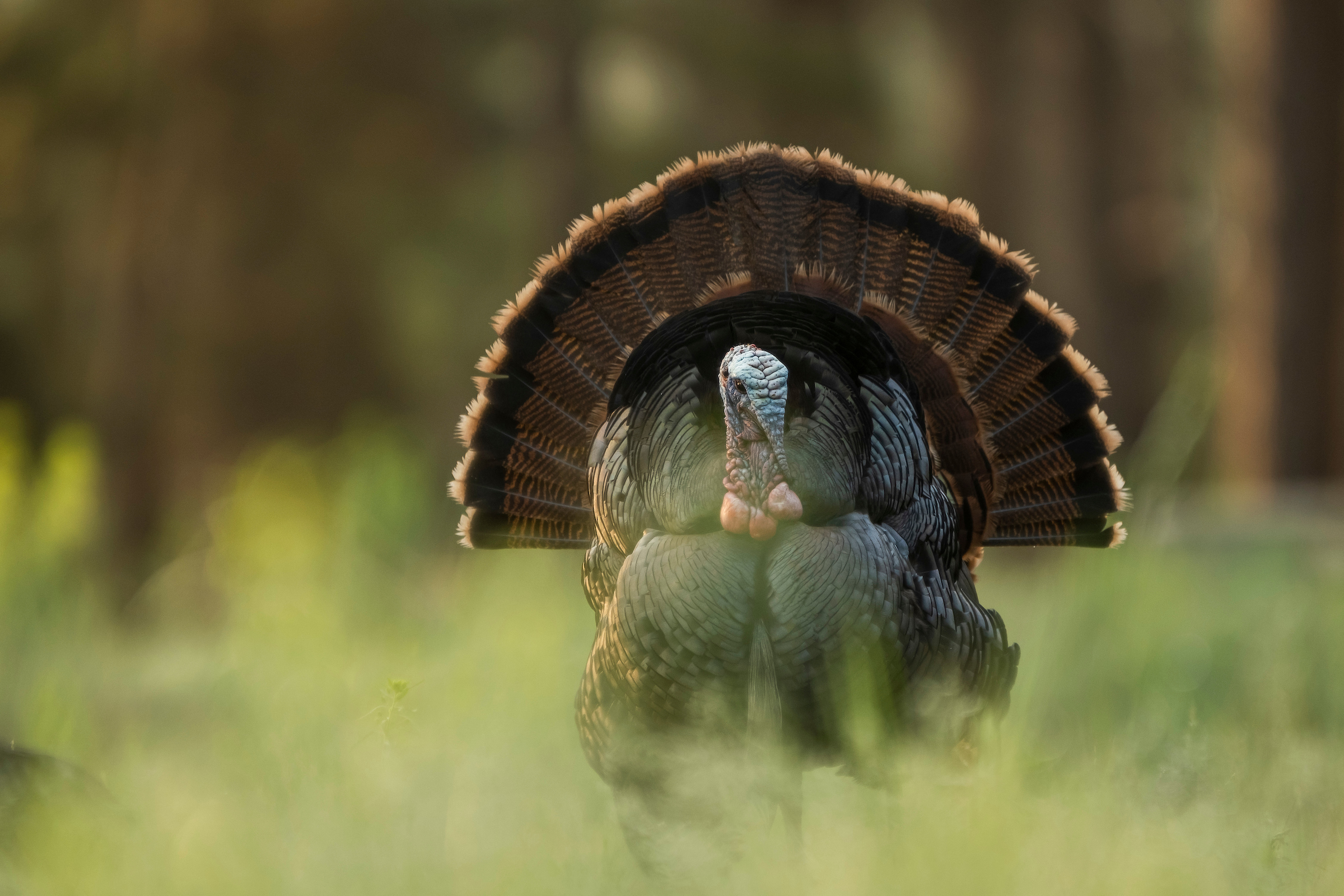
Understand tree talk. After sneaking as close as you dare to a roosted turkey, set up and listen. If the tom booms and you hear no hens yelping, don’t call too early. Wait until the skyline glimmers pink, then float a single soft tree yelp to let the bird know you’re there. If he rips a gobble, hush up. He thinks you’re a hen, and he knows where you are. Listen for him to fly down and get your gun up and ready.

Don’t rush after flydown. The instant they hear the thump of a gobbler pitching down from the roost at sunrise, most people get excited and start yelping and clucking. But keep quiet and give the bird 30 seconds or so to hit the ground, settle his feathers and ponder his next move. Now hit him with a run of sweet calls. If you call while he’s flopping down in mid-air, he won’t be able to hear you.
Hunt the middle. One of Mark Drury’s go-to tactics is to pop up a camo blind smack in the middle of a field where, from scouting, he knows a gobbler comes to strut for the day. “Get up super early and use the cover of darkness to slip in,” says Drury. “Set a hen decoy and a jake 20 yards from the blind and in the direction of where the turkey roosts.” When the bird gobbles at first light, sit tight. If he files down, works to the field and sees your decoys, he’ll usually run right to you, though with turkeys you never know. While a new blind in an open field will spook every deer that sees it, turkeys couldn’t care less and will strut right up to it.
Good scouting makes for good hunting. If you’re hunting public land in an area that gets hunting pressure, you’ve got to scout as seriously as you hunt. You need to scout other hunters as well as scouting for turkeys. This means identifying easy access points, taking note of fresh boot tracks headed toward a roosting area, and remembering what trucks are parked along the roadside before and during hunting season. The goal is to get away from all this pressure and find roosted gobblers in spots where other hunters aren’t. If you’ve got a bird roosted near a parking lot or along a trail, you can bet that other hunters are on him too. Keep looking (and listening) until you’ve got a tom pinned down well off the beaten path.
Read Next: How to Scout for Turkeys
Change it up. If you’ve worked the same gobbler from the same general spot several days in a row, change it up the next morning. Approach the roosted turkey from a different direction and set up in a fresh spot. Use a new mouth or friction call that the bird has never heard. Heck, try a gobble tube as a last resort. Be creative to fool a crabby turkey.
Walk like a turkey. One April day in Missouri, hunting legend Ray Eye was strolling along a ridge when a gobbler down in a creek bottom roared hard and out of the blue. “Every hunter I know would have set up right there and started calling like mad,” says Eye. Instead, he kept walking right toward the hidden bird. “Why set up a long way from a turkey when you know he can’t see you? Besides, by moving and shuffling leaves, a gobbler thinks another turkey is coming to him. He’ll often gobble at that.” Ray shuffled on, and the tom gobbled again. He set up 30 yards off the edge of the ridge and yelped one time. The turkey ran up out of the creek bottom and when he crested the rise, “I swear he was huffing and puffing,” Ray says. He shot the bird at 10 yards. Lesson: How you play the terrain is a lot more important than how well you call.

Set up on a bend. I learned this trick from Kentucky call maker Harold Knight: “When you get the chance, set up to call within gun range of a bend in a logging road. A gobbling turkey likes to step out into a curve where he can strut and look both ways down the road for hens.”
Challenge the boss hen. Many days in April you will sit down to work a gobbler that struts with 2 or more hens. Listen to the dominant, most vocal girl and mock her. If she yelps, you yelp. If she clucks, you cluck back. Rile up a boss hen and she may come to check out the sassy new girl in town (you)—and tow the gobbler into shooting range.

Hunt the subdominant tom. Your mocking calls to a lead hen won’t always bring in a sharp-spurred strutter, but you might get lucky and reel in a satellite tom traveling on the fringes of a small breeding flock. The turkey won’t be the dominant bird, and he might not gobble, but who cares? He’s likely a 2-year-old with a 9-inch beard. Take him.
Judge a gobbler’s range. When an Eastern turkey roars close in the timber, his gobbles seem to rattle the ground. When a Rio or Merriam’s gobbles on an open plain, he sounds like his head is stuck in a coffee can. Don’t let the acoustics of the habitat fool you. A gobbler out in the open is usually closer, sometimes much closer, than he sounds.
Keep the high ground. I have never had luck calling a gobbler down a steep slope to me. They like to stay high where they can see and strut for hens. It’s better to get above a gobbler, or at least to his equal elevation, before trying to call him in.
Know when to keep quiet. Sometimes the best turkey hunting tip is to shut up. When a turkey is gobbling and moving your way, it’s best not to call anymore. Sit back, enjoy the show, and let him come. But if he stops and hangs up 60 or 70 yards away, you’ll need to coax him discreetly. When the turkey gobbles or drums, or stirs leaves with his feet, you cluck, yelp or purr softly. When a gobbler makes noise, his hearing is less acute, and it’s tough for him to nail the precise location your calls. The bird will have to inch 20 or 30 yards closer in search of that sweet-talking hen, and that’s when you take him.
Stay ahead of an incoming gobbler. You’re set up against a tree with a turkey gobbling like a banshee 100 yards out and coming your way. Get ready to shoot him before you ever see him. Pull up your knees, rest your shotgun over them and point it toward the gobbles. If he starts to veer left, ease your body and gun to the left. If he moves right, slide your knees and gun right. Continue to flow slowly and smoothly with the turkey as he gobbles, drums and crunches leaves with his feet, so that when you finally see him, your gun barrel is pointed right at him.
Understand how turkeys see. We all know that turkeys have excellent eyesight. But turkey vision has its weak points, too. Turkeys can’t see well in the dark and they have poor depth perception. That means you can move on birds under the cover of darkness, but crossing an open field on a bright, moonlit morning will get you busted. Plus, you need to set up with cover behind you, or in front of you, or both. If a tom catches your side profile, he’ll likely bust you.
Make one shot count. When a gobbler is within 40 yards and runs his neck up like a periscope, that’s your shot. Keep your head down and dig your cheek deeply into the shotgun’s stock. Center the fiber-optic front barrel bead (or crosshair or dot of an optic) just above the major caruncles, those fleshy, gaudy, beautiful red bubbles on the base of a gobbler’s neck. Breath deeply, flip off the safety, and press the trigger.
Turkey Gear Tips
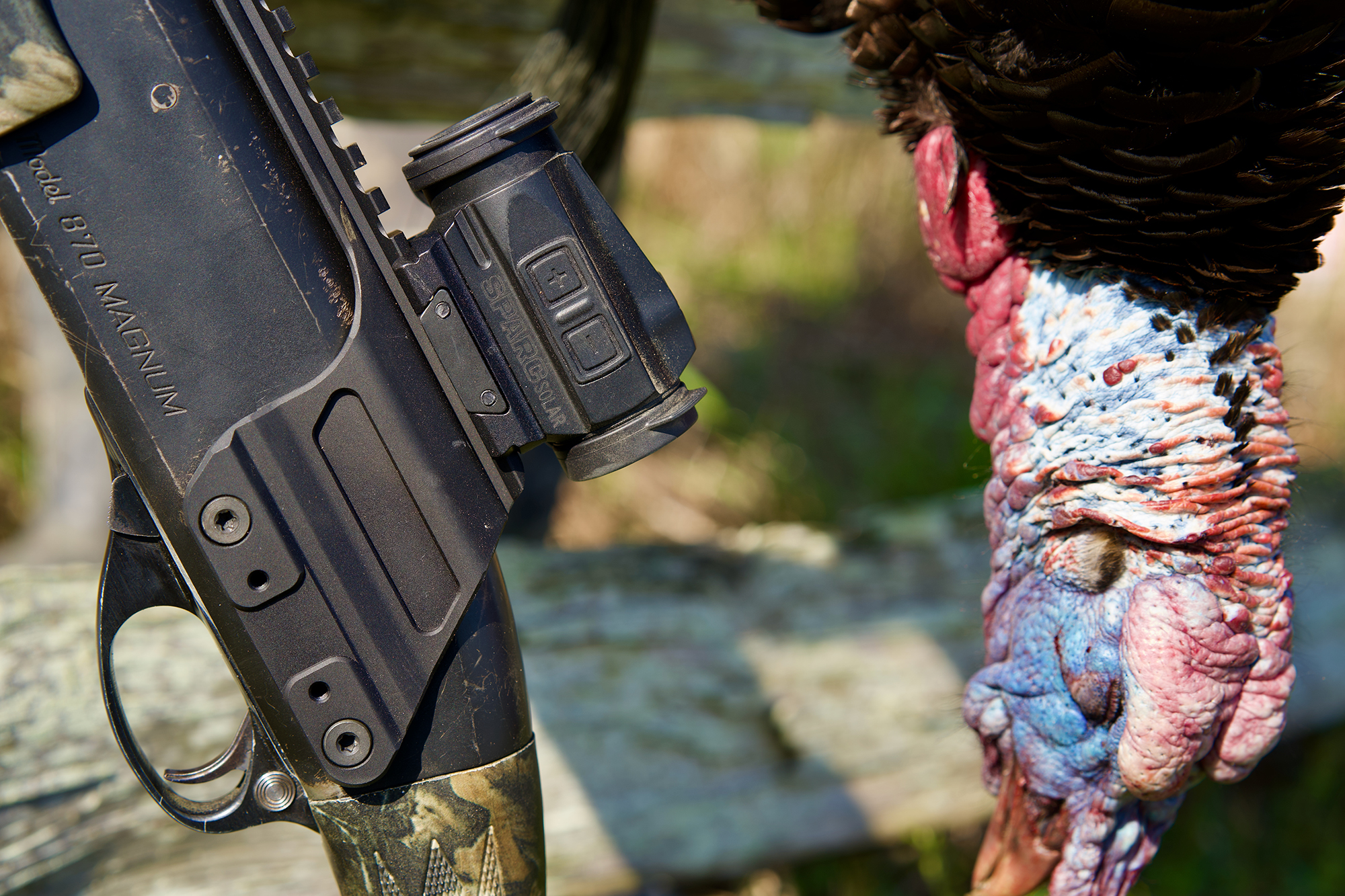
Cut your call. If a diaphragm call feels too wide and bulky in your mouth, trim the tape skirt a little bit with scissors. You can also bend the aluminum frame slightly downward to make a call fit more comfortably and create a better air seal. You’ll yelp better.
Chalk it up. Chalk a box call liberally before you hit the woods, and a couple of times during a hunt. “Use wax-free chalk that won’t gum up the grain of the wood,” says Kentucky call maker David Hale.
Know when to leave the decoys at home. Running an aggressive strutter decoy on pressured or subdominant toms will likely keep longbeards out of shooting range. Likewise, setting up a hen decoy in thick woods will often cause a tom to hang up. He’ll likely stop when he sees the decoy, expecting her to move. He might be 40 yards away from the decoy but that could be 60 yards from you—and out of sight. Sometimes it’s better to run no decoys and get the tom to hunt down your calling.
Read Next: Turkey Hunting Gear Essentials
Bring a rangefinder. Your new turkey gun, aftermarket choke, and TSS load throw a killer pattern at 60 yards. That’s great, but you have to be able to gauge that distance in the woods, which most hunters are not very good at. Take a tip from the bowhunter’s playbook and bring a rangefinder with you. When you sit down, range trees or landmarks at the edge of your maximum range. Don’t shoot beyond them
Beat the bugs. Ticks are the bane of spring turkey hunting. They carry serious diseases like lyme, alpha gal, and Rocky Mountain Spotted Fever. So treat your turkey hunting clothing with permethrin before the season. Include your boots, socks, pants, vest, hat, gloves, and all other layers. It could save you from getting a nasty tick disease.
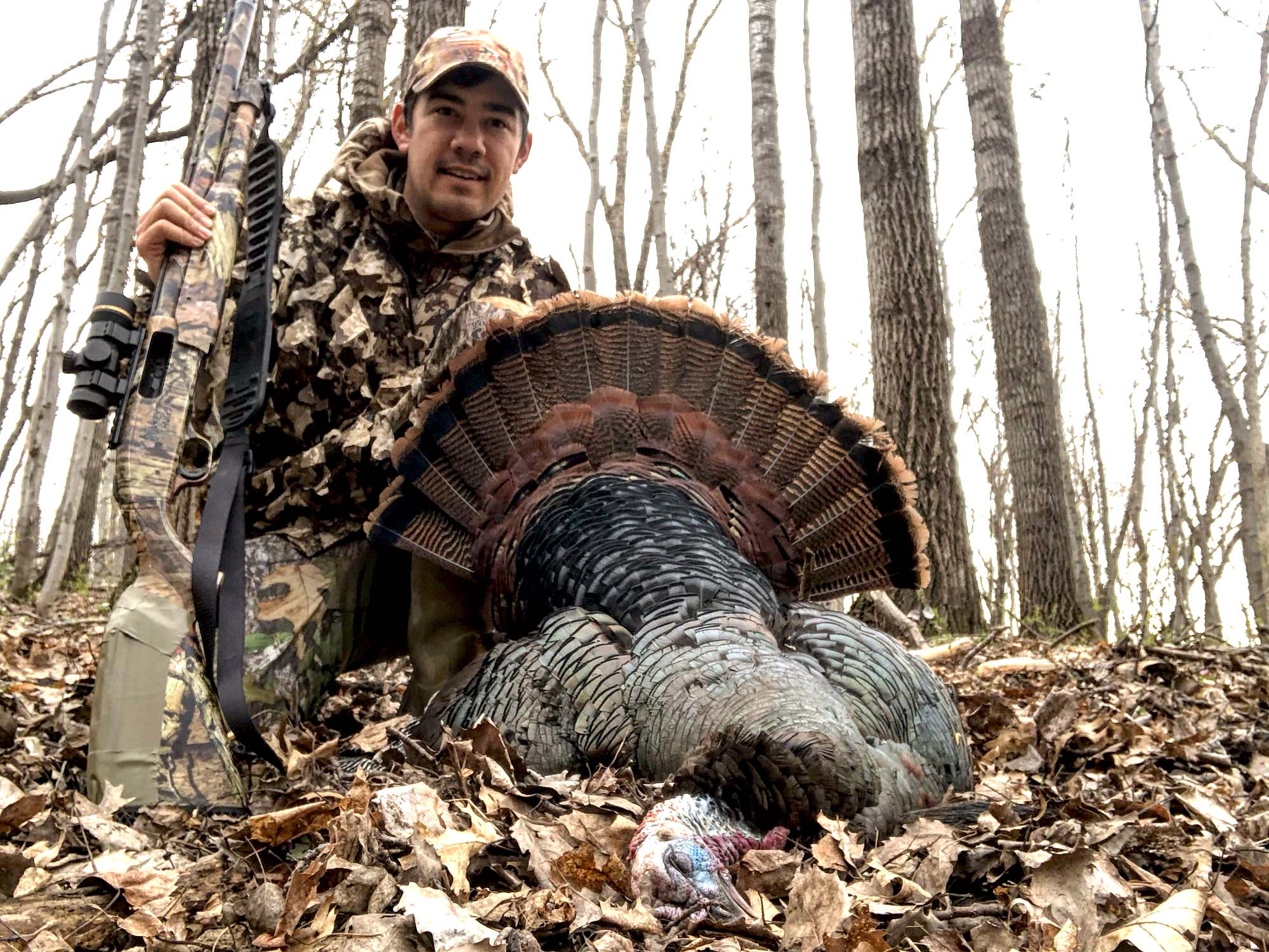
Add some comb height. You just mounted a red dot sight on your turkey gun. But since it sits a bit higher than the receiver you need to lift your head slightly off the stock to see through it. This means you need some extra comb height. You can attain this through an adjustable cheek pad or you can make your own by cutting a few strips of yoga mat and duct taping them to your stock. I chose the later option for my turkey gun and it’s served me well.
Organize your vest. Every item should have a designated spot in your turkey vest. Your ammo should go in and out of the same pocket every time. Your box call should be secured in a pocket where it won’t squeak. Your license should have its own special interior pocket. So on and so forth. This is a simple turkey hunting tip, but I’m amazed at how unorganized some turkey hunters are with their gear. Then, during the moment of truth, they’re fumbling around with something in their vest instead of doing what they should be … sitting perfectly still, ready to shoot.
Glass up a gobbler. Binoculars and spotting scopes are underrated turkey gear items. They are especially effective when scouting for roosts early in the season. A tom might not gobble when he flies up, but you’ll be able to spot him with your binoculars from far away before the leaves pop.
Always bring a backup call, or two. Some days they just won’t want to work toward even the best sounding mouth call. That’s when it pays to have a few other turkey calls in your vest. A pot call, a box call, and a mouth call are a good trio.
Shoot an aftermarket choke. Here’s a secret: You don’t have to buy a new shotgun to get high-end turkey gun performance. With the right aftermarket choke and compatible TSS loads, your trusty old duck gun can shoot incredible turkey-killing patterns. But certain chokes tend to pattern better with certain loads. Check out our review of the best turkey chokes to find out which one is an ideal match for your gun and load. Then make sure you pattern your rig before hunting. You just might be surprised by how well it shoots.
Old School Turkey Wisdom
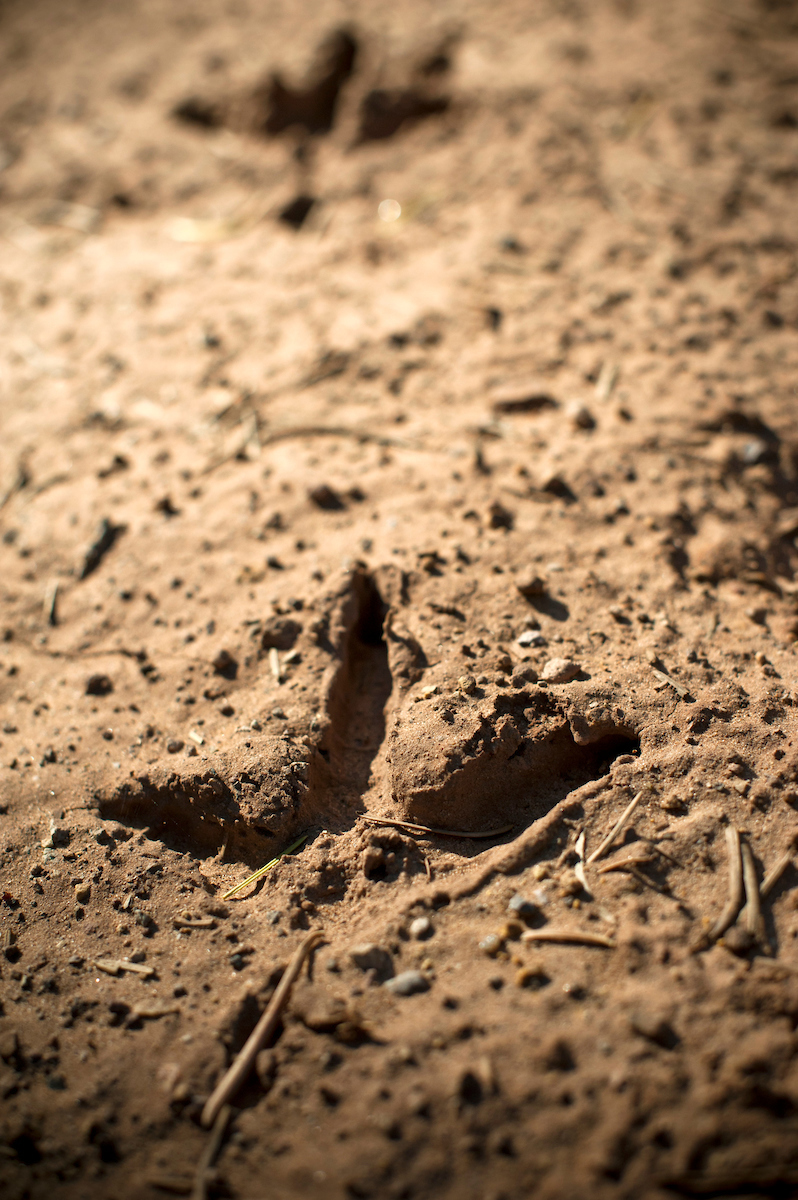
While much has changed in the world of turkey hunting since the early days, some of the tactics the old masters used to bag gobblers back then are still among the very best tactics to use today. That’s why we sought out three of the best who were willing to share their wisdom, along with a few tricks that work when nothing else will. —Doug Howlett
Tom Kelly: Prioritize Woodsmanship Over Calling
Too much emphasis has been put on calling, and from that a run-and-gun mentality has emerged, says Tom Kelly, who wrote the preeminent book on turkey hunting, Tenth Legion, in 1973.
“I don’t believe yelping or calling is more than 30 percent of turkey hunting,” says Kelly. “It’s really such a small part of being successful.” Too many hunters, he explains, simply start out walking and calling, and as soon as they hear a bird gobble, they drop down by the nearest tree and try to call him in. Unbeknownst to most of those hunters, their hunt is already doomed and no amount of good calling is going to work for them.
“They have no earthly clue what is between them and that gobbler, and without that knowledge, they’re going to lose out more than they’re going to win,” Kelly says.
As a retired forester who spent more than 40 years hunting the woods of his native Alabama, Kelly says the best way to learn a property is to walk it. Sure, today’s high-tech aerial photos can be of use, but actually walking a forest—the trails and stream sides—to see how a turkey will use the terrain is vital. Terrain can change from year to year, as well as when forests are cut or groups of trees fall down in storms. Water in swamps and creeks can ebb and flow with the rain. And a field that was open for strutting last year, for example, may have gone unmowed, making it less attractive to birds. Although wild turkeys do fly over creeks and fences and go around blowdowns or thick cover during normal travel, they’re often reluctant to cross such barriers when responding to a hen’s calls. Kelly recommends walking the terrain to become intimate with potential obstacles—creeks, fences, thick tangles of brush, blowdowns, steep hillsides, anything that might impede a bird’s approach to your calls. Then keep them in mind each time you set up.
If a tom gobbles and you know there is an obstacle such as a stream or fence between you, don’t just plop down and hope for the best. If necessary, back out of the area and circle around, putting yourself on the same side of the object or terrain feature as the gobbler.
“You have to make it as easy as possible for that tom to come to you,” says Kelly. Where you set up is critical, as is time of the season, and Kelly’s advice runs counter to most modern turkey hunting philosophy.
“If you gave me only two weeks in the season to hunt, I would take the last two,” says Kelly. “Everyone else has given up. But that gobbler still wants to breed.”
Gene Smith: Pick the Perfect Setup
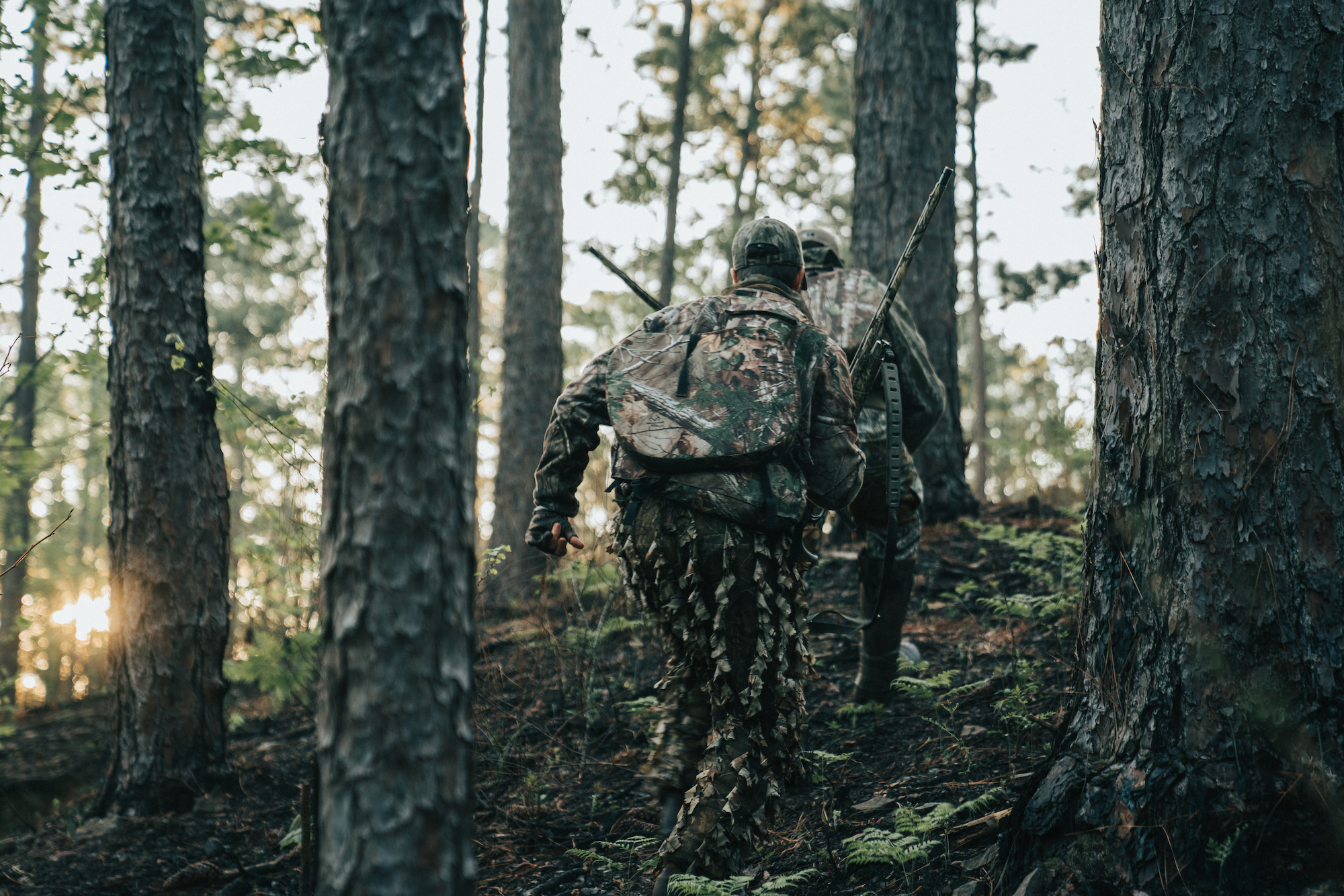
South Carolinian and former Turkey Call magazine editor Gene Smith says one of the most important turkey hunting tips is to sit in a spot and facing the direction the bird is most likely to approach from. And that isn’t always in the same direction from which the bird is gobbling. In some ways, it’s like Kelly’s suggestion to learn where the obstacles are in the woods. But in this instance, it’s more about identifying within a certain radius where the obstacles aren’t.
“A hunter has to survey the terrain immediately around him to determine which way the bird will want to walk,” Smith says. That means identifying a gap in a fence, or an open lane through thick brush or cover, or even a brow in a field that will allow a bird to stay hidden as it approaches, poking only its head up to survey what lies ahead. In big woods, gobblers seldom stroll straight in, choosing instead to glide behind large trees and peeking around them as they get closer to where the calls are coming from. Ultimately, though, the approach has to be hassle-free, allowing a tom to approach in strut and providing the illusion that he can spot possible danger.
Once you’ve picked out a likely approach, set up with that spot slightly off your left shoulder (or your right shoulder if you’re a lefty), so you can swing your shotgun more easily to the right or the left should the tom deviate from the anticipated path. If possible, set up against a tree wider than your shoulders both for safety (protecting you from a possible hunter’s approach from behind) and to keep your silhouette hidden from the approaching tom. Trust your camo, sit still, and don’t set up in brush so thick you can’t swing your gun. In fact, sometimes you shouldn’t even sit.
“If necessary, stand up against a tree. Don’t sit down,” says Smith. “If there is low brush or a slight rise, standing may help you see that turkey better and give you a cleaner shot.
John Keesee: Read a Gobbler
Former Mississippi cotton farmer and longtime turkey hunter Johnny Keesee says a hunter has to be able to read a bird and adjust his approach accordingly.
His first turkey hunting mentor, the late Newton McWilliams, was an old-school type who would yelp three times on his Lynch box call and not call again for 30 or 40 minutes. McWilliams killed a lot of birds that way. Keesee’s next teacher, a contemporary of his, Jim Humber, was much more active in his approach—quickly closing the gap on a gobbling bird, calling more aggressively, and getting up and moving if a bird was still a long way off. He also killed a lot of birds. Through both of them, Keesee came to understand the importance of reading a bird’s mood and adjusting his tactics accordingly.
Read Next: Why Do Turkeys Gobble at Owls?
His goal each hunting day is to set up as close to a roosted tom as possible (ideally, within 100 yards) to minimize interaction with interloping hens. He will then wait until the tom gobbles before making soft tree calls. That’s the McWilliams influence working. But if the first birds he hears are competing hens in the trees around him, he says, he’ll start “hammering” the call, working to stay a notch above in volume and intensity. That’s the Humber influence.
“I want to be the dominant hen,” Keesee says. His hope is to get the boss hen or the gobbler—or both—to pitch down nearby. Sometimes, the gobbler can’t stand it and drops down earlier. If no hens are present and the tom responds, Keesee is content to let the tom fly down and work his way in.

